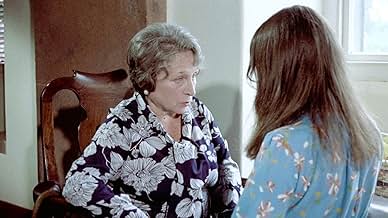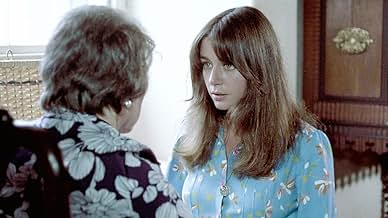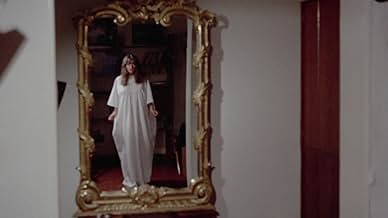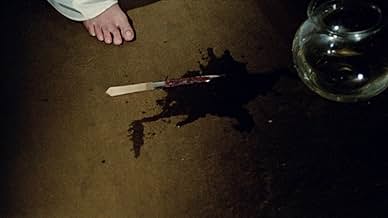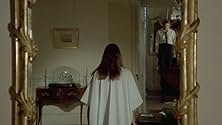IMDb RATING
5.5/10
490
YOUR RATING
A nightclub singer is haunted by the ghost of her late father. The dead man summons her through a mirror, forcing her to commit a series of violent crimes.A nightclub singer is haunted by the ghost of her late father. The dead man summons her through a mirror, forcing her to commit a series of violent crimes.A nightclub singer is haunted by the ghost of her late father. The dead man summons her through a mirror, forcing her to commit a series of violent crimes.
- Awards
- 1 win total
Robert Woods
- Bill
- (as Robert Wood)
Françoise Brion
- Carla
- (as Francoise Brion)
Alice Arno
- Tina
- (as Alice Arnó)
María Bassó
- Elvira
- (as Maria Bassó)
Ada Tauler
- Stefania
- (as Adela Tauler)
Chantal Broquet
- Angela
- (uncredited)
Carmen Carbonell
- Tante
- (uncredited)
Jesús Franco
- Roger
- (uncredited)
Nicole Guettard
- Gloria
- (uncredited)
- Director
- Writers
- All cast & crew
- Production, box office & more at IMDbPro
Featured reviews
I've only seen about 15 Jess Franco films so far, which is actually saying very little considering the countless amount of films he made, and in spite of the beyond-awful conditions the print I watched had, "Al Otro Lado del Espejo" (which translates to English as "The Other Side of the Mirror") still managed to make a impression on me, and might as well be the finest Franco film I've seen so far. Coming straight after Soledad Miranda's death, and not unlike the interesting but deeply flawed "A Virgin Among the Living Dead", this one is a haunting, beautiful study on death and grief, that "mirrors" Franco's own emotional breakdown after the death of his muse. The story stars Emma Cohen as Anna - a young bride-to-be who suffers a breakdown after her father (Franco-regular Howard Vernon) commits suicide on the eve of her wedding. She then starts having visions of her father through mirrors, beckoning her, and soon enough, goes on a killing spree against the men who sexually arouse her. The script is very cleverly written, with well developed characters that you actually care for, as well as being filled with Greek-mythology symbolism and Freudian motifs. Franco also benefits largely from having one of the best actresses he ever worked with playing the lead role. Cohen has that same innocents, doe-eyed beauty of Jessica Harper in "Suspiria", and gives one harrowing, psychotic and ultimately hearth-breaking performance as our grieving protagonist. The music, as usual for a Franco film, has great importance within the context of the film (since Anna is a nightclub singer who often "escapes" from her hectic life by entering into a "purely musical" state of mind), and composer Adolfo Waitzman (who also scored the same year's "A Bell from Hell" and the underrated "Pensione Paura") just nails it with a wonderful jazzy score. Another great aspect of the film is that this is probably the first Franco film that was actually creeped me out, and predates "Candyman" for almost 30 as far as "making mirrors scary as Hell" is concerned. Although the version I saw of this film was in a terrible state and was actually hard to watch at times, the cinematography appeared to be quite good, thus making it even sadder that it isn't available in a remastered, polished DVD. Speaking of which, the film is only available (this cut, at least) in Spanish with no subtitles, but since this is a very visual film (and if you know the main plot beforehand), it's not hard to figure out what's going on. The major problem with this film is that it starts quite well, but looses steam in between the end of the second act and beginning of the third, as Franco seemingly forgets he is a doing a horror film and just throws a series of non-stop, dull "jam sessions" that, though somewhat relevant to the plot, go on for a bit too long, ruining the oppressive atmosphere it had been building for so long. Thankfully, the film gets it's steam back at the ending, which remains the most powerful, twisted and just plain haunting I've seen in a Franco film. Overall, a brilliant gem of Spanish horror film that, though not for everyone, is essential viewing for fans of Eurohorror and Jess Franco alike. 9/10 Be aware, however, that the film is available in three different versions. The original Spanish cut, which is the version I've seen and the one Franco prefers; the soft-core French version which replaces Howard Vernon for Lina Romay as Anna's dead nymphomaniac sister; and the hardcore Italian version that adds even more sex and sleaze to the French version. The last two versions, though I've never actually seen them, seemingly does to the film what "House of Exorcism" did to "Lisa and the Devil", totally butchering what the director was aiming for, and should be avoided unless you're a hardcore Franco fan.
This average-budget film contains thrills , a criminal intrigue and various murders . It's a passable slasher movie directed by prolific filmmaker Jess Frank concerning a nightclub singer is haunted by the ghost of her late dad . Anetta(Emma Cohen) is a pianist in cabarets and nightclubs , she's very close to her widower father (Howard Vernon) after their mother's death . Anetta suffers a tragedy on the eve of her wedding to Arturo (Wal Davis) , as his father is extremely opposed to this marriage , that's why he commits suicide by hanging . Later on , the dead man summons her through a mirror , forcing her to commit a series of violent crimes . This becomes a nightmare for her when she starts seeing him in all the mirrors making signs.
Austerily slasher film revolving around an unsettling , deranged young woman who suffered an emotional crisis that is torn between death and pain expressed in the reflection of the windows . It contains thrills , chills , haunting poetic fantasy , nudism and grisly killings . Here Franco manages to give us an adequate ambient , evocative production design , being regularly narrated , including a murders plot enough to keep you intrigued throughout the flick . In this passable as well as eerie yarn , Franco established his ordinary poetic and visually striking style . There are other versions in which Annette and Mary are sisters , and the latter haunting Annette on the mirror and another hardcore retelling with Lina Romay , Franco's muse , playing the erotic scenes , as usual . Emma Cohen gives a decent acting as singer/pianist Ana who will kill all men who feels sexually attracted to her by fulfilling the wishes of the late daddy . She's well accompanied by a good cast , some of them Franco's regulars , such as : Robert Woods , Alice Arno , Françoise Brion , Philippe Lemaire , Ramiro Oliveros and Howard Vernon as the father incites her to an unprecedented massacre. And Jesus Franco or Jess Frank cameo as a pianist at a bar .
One of the slasher movies by prolific writer/producer/director Jesús Franco , one of the kings of the ¨Spanish Fantaterror¨, and considered to be one of the best films from his second period . Jesús Franco who never considered the film to be a horror story , but instead felt it was tale of "anguish". Being produced in short budget by Robert de Nesle and José María Forqué . It packs evocative cinematography by Antonio Millán, filmed on Portuguese locations in Lisbon, Madeira, Tobis Portuguesa, Lumiar, Lisbon, (studio) . Likewise, atmospheric musical score by André Bénichou and Adolfo Waitzman, including Jazzy soundtrack and catching songs . The motion picture was regular but professionally directed by Jesus Franco. However , here he doesn't use his trademarks , as he carries out a traditional narration , without excessive zooms , neither lousy pace . Jesus uses to sign under pseudonym , among the aliases he used, apart from the names Jess Franco or Franco Manera, were Jess Frank, Robert Zimmerman, Frank Hollman, Clifford Brown, David Khune , Toni Falt, James P. Johnson, Charlie Christian, David Tough , among others . Franco used to utilize usual marks such as zooms , nudism , foreground on objects , filmmaking in ¨do-it-yourself effort¨ style or DIY , double-versions , and managing to work extraordinarily quickly . In many of the more than 180 films he's directed he has also worked as composer, writer, cinematographer and editor. His first was "We Are 18 Years Old" and the second picture was ¨Gritos en la Noche¨ (1962) , the best of all them , also titled "The Awful Dr. Orlof" , it's followed by various sequels such as El Secreto del Dr. Orloff (1964) aka "The Mistresses of Dr. Jekyll" , " Orloff y el hombre invisible (1970) aka "Dr. Orloff's Invisible Monster" and finally "Faceless" (1987) . He also directed to the great Christopher Lee in 4 films : "The Bloody Judge" , ¨Count Dracula¨, ¨The Blood of Fu Manchu¨ and ¨The castle of Fu Manchu¨ . Jesús's influence has been notable all over Europe . From his huge body of work we can deduce that Jesús Franco is one of the most restless directors of Spanish cinema and often releasing several titles at the same time. Many of his films have had problems in getting released, and others have been made directly for video. More than once his staunchest supporters have found his "new" films to contain much footage from one or more of his older films . Jesús Franco is a survivor in a time when most of his colleagues tried to please the government administration. He broke up with all that and got the independence he was seeking. He always went upstream in an ephemeral industry that fed opportunists and curbed the activity of many professionals . But time doesn't pass in vain, and Jesus' production diminished since the 90s ; however he went on shooting until his death . Al otro lado del espejo (1973) rating : 5.5/10 . Mediocre but passable.
Austerily slasher film revolving around an unsettling , deranged young woman who suffered an emotional crisis that is torn between death and pain expressed in the reflection of the windows . It contains thrills , chills , haunting poetic fantasy , nudism and grisly killings . Here Franco manages to give us an adequate ambient , evocative production design , being regularly narrated , including a murders plot enough to keep you intrigued throughout the flick . In this passable as well as eerie yarn , Franco established his ordinary poetic and visually striking style . There are other versions in which Annette and Mary are sisters , and the latter haunting Annette on the mirror and another hardcore retelling with Lina Romay , Franco's muse , playing the erotic scenes , as usual . Emma Cohen gives a decent acting as singer/pianist Ana who will kill all men who feels sexually attracted to her by fulfilling the wishes of the late daddy . She's well accompanied by a good cast , some of them Franco's regulars , such as : Robert Woods , Alice Arno , Françoise Brion , Philippe Lemaire , Ramiro Oliveros and Howard Vernon as the father incites her to an unprecedented massacre. And Jesus Franco or Jess Frank cameo as a pianist at a bar .
One of the slasher movies by prolific writer/producer/director Jesús Franco , one of the kings of the ¨Spanish Fantaterror¨, and considered to be one of the best films from his second period . Jesús Franco who never considered the film to be a horror story , but instead felt it was tale of "anguish". Being produced in short budget by Robert de Nesle and José María Forqué . It packs evocative cinematography by Antonio Millán, filmed on Portuguese locations in Lisbon, Madeira, Tobis Portuguesa, Lumiar, Lisbon, (studio) . Likewise, atmospheric musical score by André Bénichou and Adolfo Waitzman, including Jazzy soundtrack and catching songs . The motion picture was regular but professionally directed by Jesus Franco. However , here he doesn't use his trademarks , as he carries out a traditional narration , without excessive zooms , neither lousy pace . Jesus uses to sign under pseudonym , among the aliases he used, apart from the names Jess Franco or Franco Manera, were Jess Frank, Robert Zimmerman, Frank Hollman, Clifford Brown, David Khune , Toni Falt, James P. Johnson, Charlie Christian, David Tough , among others . Franco used to utilize usual marks such as zooms , nudism , foreground on objects , filmmaking in ¨do-it-yourself effort¨ style or DIY , double-versions , and managing to work extraordinarily quickly . In many of the more than 180 films he's directed he has also worked as composer, writer, cinematographer and editor. His first was "We Are 18 Years Old" and the second picture was ¨Gritos en la Noche¨ (1962) , the best of all them , also titled "The Awful Dr. Orlof" , it's followed by various sequels such as El Secreto del Dr. Orloff (1964) aka "The Mistresses of Dr. Jekyll" , " Orloff y el hombre invisible (1970) aka "Dr. Orloff's Invisible Monster" and finally "Faceless" (1987) . He also directed to the great Christopher Lee in 4 films : "The Bloody Judge" , ¨Count Dracula¨, ¨The Blood of Fu Manchu¨ and ¨The castle of Fu Manchu¨ . Jesús's influence has been notable all over Europe . From his huge body of work we can deduce that Jesús Franco is one of the most restless directors of Spanish cinema and often releasing several titles at the same time. Many of his films have had problems in getting released, and others have been made directly for video. More than once his staunchest supporters have found his "new" films to contain much footage from one or more of his older films . Jesús Franco is a survivor in a time when most of his colleagues tried to please the government administration. He broke up with all that and got the independence he was seeking. He always went upstream in an ephemeral industry that fed opportunists and curbed the activity of many professionals . But time doesn't pass in vain, and Jesus' production diminished since the 90s ; however he went on shooting until his death . Al otro lado del espejo (1973) rating : 5.5/10 . Mediocre but passable.
For years and years, I fanatically defended the work of writer/director Jess Franco, but with every film of his that I watch, I wonder why I ever bothered. Maybe I should accept the fact Franco only made a handful of influential and genuine exploitation classics ("The Awful Dr. Orloff", "The Diabolical Dr. Z", "Faceless"), whereas the vast majority of his excessively large repertoire is just utter garbage.
And yet, for a good 15-20 minutes, it really seemed as if "The Obscene Mirror" would become another Franco-winner! The first quarter is definitely promising, with the introduction of a widower (Franco-regular Howard Vernon) and his two beautiful daughters Annette and Marie. Annette is head over heels in love with archeology student Arthur, but Marie is so jealous of her sister's happiness that she commits suicide by ramming a sword in her stomach one day before the wedding. Following the tragedy, Annette is so confused that she abruptly calls off her wedding and starts a new life as piano player in a raunchy bar. From this moment on, Annette hears and sees her sister appearing in an antique mirror, and Marie's vengeful spirit commands her to brutally slaughter every man she's sexually attracted to.
At least, this is the plot of the version I watched, because - apparently - there also exists a version in which it's Annette's father who commits suicide and commands her to kill. Oh well, just another typical flick in Jess Franco's bizarre universe.
With the exception of the compelling first 15 minutes, "The Obscene Mirror" is a dreadfully boring and frustrating film. Franco reverts to his bad habit of inserting overlong (and very un-sexy) hardcore footage, which absolutely doesn't have any added value. During countless of times during the film, you'll find yourself staring at extreme close-ups of a vagina (probably Lina Romay's), and listening to the sounds of either monotonous moaning or jazzy musical tunes. I don't know which of the two was more irritating.
For some strange reason I will never comprehend, "The Obscene Mirror" - in whatever version - is regarded as one of Franco's finest films, and this also gets confirmed by most of the user-comments on this website. Maybe it's fanstastic if endless close-ups of female genitalia are your thing, but it seems to me there are more effective channels for that.
And yet, for a good 15-20 minutes, it really seemed as if "The Obscene Mirror" would become another Franco-winner! The first quarter is definitely promising, with the introduction of a widower (Franco-regular Howard Vernon) and his two beautiful daughters Annette and Marie. Annette is head over heels in love with archeology student Arthur, but Marie is so jealous of her sister's happiness that she commits suicide by ramming a sword in her stomach one day before the wedding. Following the tragedy, Annette is so confused that she abruptly calls off her wedding and starts a new life as piano player in a raunchy bar. From this moment on, Annette hears and sees her sister appearing in an antique mirror, and Marie's vengeful spirit commands her to brutally slaughter every man she's sexually attracted to.
At least, this is the plot of the version I watched, because - apparently - there also exists a version in which it's Annette's father who commits suicide and commands her to kill. Oh well, just another typical flick in Jess Franco's bizarre universe.
With the exception of the compelling first 15 minutes, "The Obscene Mirror" is a dreadfully boring and frustrating film. Franco reverts to his bad habit of inserting overlong (and very un-sexy) hardcore footage, which absolutely doesn't have any added value. During countless of times during the film, you'll find yourself staring at extreme close-ups of a vagina (probably Lina Romay's), and listening to the sounds of either monotonous moaning or jazzy musical tunes. I don't know which of the two was more irritating.
For some strange reason I will never comprehend, "The Obscene Mirror" - in whatever version - is regarded as one of Franco's finest films, and this also gets confirmed by most of the user-comments on this website. Maybe it's fanstastic if endless close-ups of female genitalia are your thing, but it seems to me there are more effective channels for that.
Obscene Mirror (1973)
*** (out of 4)
This is a pretty well, if highly praised, film from the Spanish director, which is (apparently) available in three different versions. The version getting all the love and praise is the Spanish version while the French and Italian versions are re-edited with hardcore scenes and an alternate cast added to the mix. The version I watched was the Italian one, which is hard to review due to the hardcore scenes, which were added. The basic plot, I believe, is the same from each version and centers on a woman (Emma Cohen) who suffers a breakdown after the suicide of her sister (played by Lina Romay in this version). Soon after the suicide the sister begins to see her dead sister inside a mirror, which causes her to go out, bring men home and kill them. Again, it's really hard to judge this film due to the added scenes and the fact that the Spanish version is apparently totally different but there was enough here to I loved to recommend people seeing this but at the same time you should certainly try and get the original version (which I will be looking for). The film reminded me a lot of Franco's Venus in Furs, which is among the director's best films. There's a deeply haunting, sad and tragic nature and atmosphere, which runs throughout this film and it wasn't hard to get caught up into the mental state of the main character. Franco's direction is very sharp throughout but most of the credit has to go towards Cohen who is simply terrific in the film. She doesn't have to resort to nudity or cheap thrills to get her performance across. I guess the best way to explain it is that she comes across like a spirit and just floats from one scene to the next, slowing breaking down in front of our eyes. Sadly the disc I watched also didn't feature any subtitles so I couldn't follow any of the dialogue, which there was plenty of and I'm sure if I could follow the story more I would have loved it even more. The hardcore scenes, which again, were added, are pretty ugly and add absolutely nothing to the movie. These scenes really killed everything that was going on so I found myself hitting the FF button through them. I'm hoping to track down the director's cut soon since most fans think this Italian version is a complete mess. If it is a mess and I enjoyed it this much then I can't wait to see what the Spanish one offers.
*** (out of 4)
This is a pretty well, if highly praised, film from the Spanish director, which is (apparently) available in three different versions. The version getting all the love and praise is the Spanish version while the French and Italian versions are re-edited with hardcore scenes and an alternate cast added to the mix. The version I watched was the Italian one, which is hard to review due to the hardcore scenes, which were added. The basic plot, I believe, is the same from each version and centers on a woman (Emma Cohen) who suffers a breakdown after the suicide of her sister (played by Lina Romay in this version). Soon after the suicide the sister begins to see her dead sister inside a mirror, which causes her to go out, bring men home and kill them. Again, it's really hard to judge this film due to the added scenes and the fact that the Spanish version is apparently totally different but there was enough here to I loved to recommend people seeing this but at the same time you should certainly try and get the original version (which I will be looking for). The film reminded me a lot of Franco's Venus in Furs, which is among the director's best films. There's a deeply haunting, sad and tragic nature and atmosphere, which runs throughout this film and it wasn't hard to get caught up into the mental state of the main character. Franco's direction is very sharp throughout but most of the credit has to go towards Cohen who is simply terrific in the film. She doesn't have to resort to nudity or cheap thrills to get her performance across. I guess the best way to explain it is that she comes across like a spirit and just floats from one scene to the next, slowing breaking down in front of our eyes. Sadly the disc I watched also didn't feature any subtitles so I couldn't follow any of the dialogue, which there was plenty of and I'm sure if I could follow the story more I would have loved it even more. The hardcore scenes, which again, were added, are pretty ugly and add absolutely nothing to the movie. These scenes really killed everything that was going on so I found myself hitting the FF button through them. I'm hoping to track down the director's cut soon since most fans think this Italian version is a complete mess. If it is a mess and I enjoyed it this much then I can't wait to see what the Spanish one offers.
This is a Jess Franco film which seems to have garnered something of a good reputation amongst the vast array of his output. While I perused through the user reviews here I couldn't help but wonder if I had seen the same film, as from the plot synopsis offered by many of these I found there were several very key things I couldn't recall even happening on screen. I soon discovered that the reason for this is that there are three versions of this movie - the Spanish being the definitive cut it seems – and I saw the Italian variant which, like several other Franco films from the period had been turned into an adult film by way of some hardcore scenes being spliced into the flow. I think it would be only fair to guess that this version is not the best out there and compromises Franco's original vision somewhat.
The story is about a woman who goes into a downward psychological spiral after the suicide of her sister. She subsequently sees visions of her dead sibling which leads her to go out and murder men.
One of the chief differences between the versions is that in the Spanish one it is her dead father (played by Franco regular Howard Vernon) who she sees from beyond the grave, as opposed to her sister in the Italian version. This change seems to have been made principally to allow for the introduction of Lina Romay who, in her role as the sister, spends the whole time frolicking around naked and is at the centre of all the hardcore scenes too. These scenes, incidentally, are fairly half-heartedly executed and seem to be there simply as a means of selling the movie as an adult feature. However, unless I simply wasn't paying very good attention, this change also means that the whole mirror idea seems to have been more or less eradicated aside from a scene late on where it is smashed resulting in the breaking of the supernatural spell. Up to that point however, it seemed to me that all of this malarkey was going on in the head of the main actress, not playing out in an actual mirror! Despite these issues with the Italian version, this still made for interesting enough viewing. Despite its definite sexploitation angle, it is in essence quite a haunting tale. It's quite hard to reasonably categorize in actual fact because it has several feet in different sub-genres without truly focusing on one thread fully. I can only really comment on the version I have seen and going by that I couldn't put this in the upper bracket of Franco features; it's in the top half of his output though for sure. Like most of his films it has that rushed look and feel, while the production values are pretty limited. But it would seem that the Spanish version is the one to see if you want a proper reflection of this one's merits.
The story is about a woman who goes into a downward psychological spiral after the suicide of her sister. She subsequently sees visions of her dead sibling which leads her to go out and murder men.
One of the chief differences between the versions is that in the Spanish one it is her dead father (played by Franco regular Howard Vernon) who she sees from beyond the grave, as opposed to her sister in the Italian version. This change seems to have been made principally to allow for the introduction of Lina Romay who, in her role as the sister, spends the whole time frolicking around naked and is at the centre of all the hardcore scenes too. These scenes, incidentally, are fairly half-heartedly executed and seem to be there simply as a means of selling the movie as an adult feature. However, unless I simply wasn't paying very good attention, this change also means that the whole mirror idea seems to have been more or less eradicated aside from a scene late on where it is smashed resulting in the breaking of the supernatural spell. Up to that point however, it seemed to me that all of this malarkey was going on in the head of the main actress, not playing out in an actual mirror! Despite these issues with the Italian version, this still made for interesting enough viewing. Despite its definite sexploitation angle, it is in essence quite a haunting tale. It's quite hard to reasonably categorize in actual fact because it has several feet in different sub-genres without truly focusing on one thread fully. I can only really comment on the version I have seen and going by that I couldn't put this in the upper bracket of Franco features; it's in the top half of his output though for sure. Like most of his films it has that rushed look and feel, while the production values are pretty limited. But it would seem that the Spanish version is the one to see if you want a proper reflection of this one's merits.
Did you know
- GoofsIn the end credits of the Spanish version, Françoise Brion is credited as Carla and Alice Arno is credited as Tina but in the film, it's the other way around.
- ConnectionsReferenced in Franco Noir (2021)
- How long is The Other Side of the Mirror?Powered by Alexa
Details
- Runtime1 hour 22 minutes
- Sound mix
- Aspect ratio
- 1.85 : 1
Contribute to this page
Suggest an edit or add missing content

Top Gap
By what name was The Other Side of the Mirror (1973) officially released in India in English?
Answer
